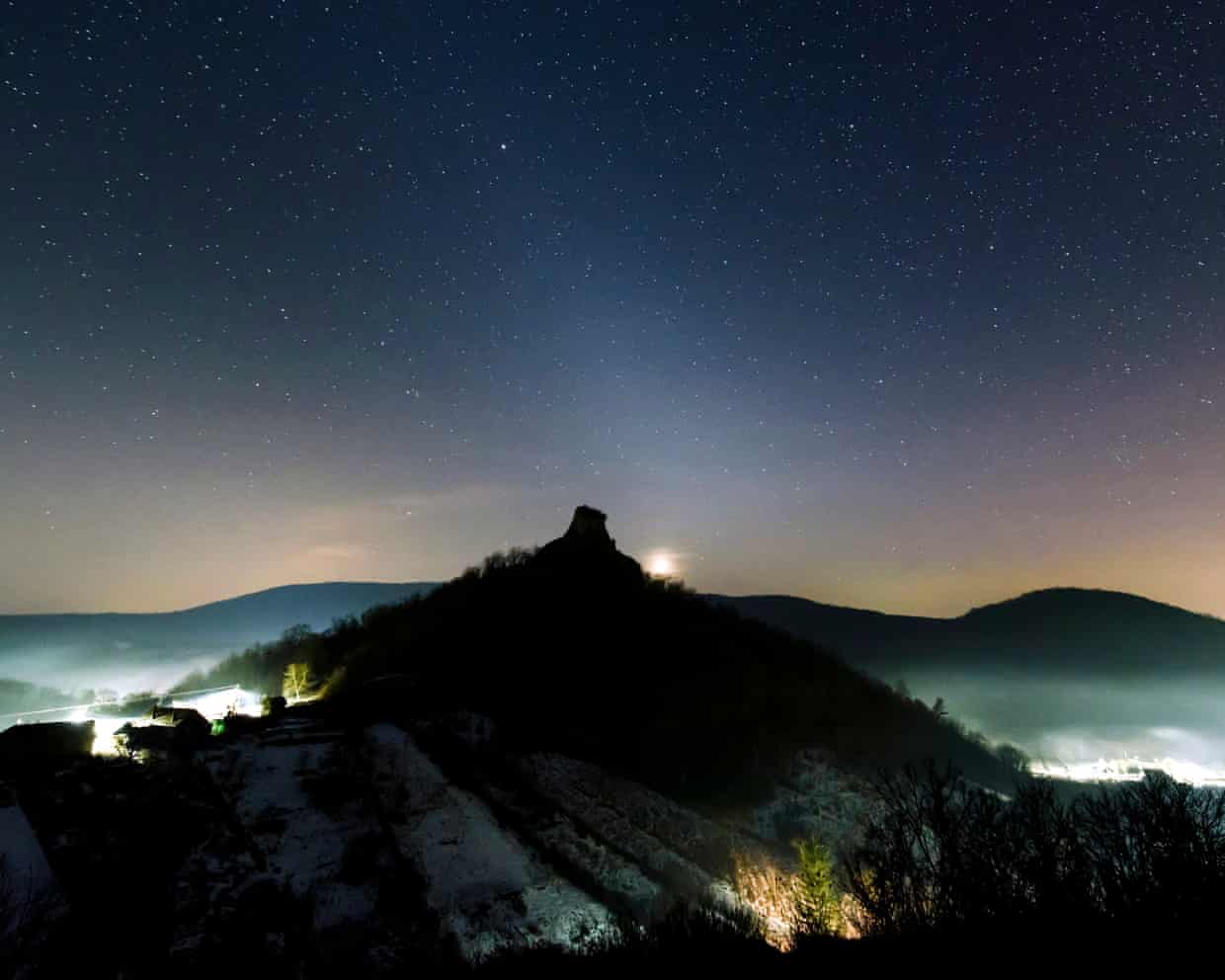Science
Skywatchers Set to Experience Zodiacal Light This Week

Skywatchers this week have the opportunity to observe a subtle yet captivating celestial phenomenon known as zodiacal light. This soft glow results from sunlight scattering off interplanetary dust that resides in the plane of our solar system. The dust originates from comets and collisions between asteroids, creating a unique visual effect in the night sky.
The zodiacal light manifests as a faint triangular glow that stretches upwards from the horizon. During this period, which follows the recent equinox, the plane of the solar system—referred to as the ecliptic—rises steeply from the western horizon into the sky. Observers in the Northern Hemisphere should seek out the darkest locations with a clear view towards the eastern horizon. To best witness this celestial glow, it is advisable to begin observations approximately one hour before dawn twilight, which means starting at around 4:00 AM UK time.
For those in the Northern Hemisphere, the zodiacal light can be spotted near the constellations of Leo and Cancer. The appearance resembles that of dawn but is distinguishable by its wedge-like shape. As the light illuminates the sky, it serves as a reminder of the beauty and complexity of our solar system.
In contrast, skywatchers in the Southern Hemisphere will have a different experience. The zodiacal light will become visible about one hour after sunset, stretching upwards from the western horizon. Observers can expect to see a soft wedge of light extending through the constellations of Virgo and Libra.
To enhance the viewing experience, it is crucial to find an area free from light pollution. With the right conditions, the zodiacal light can offer a stunning visual display, inviting all skywatchers to appreciate the wonders of the universe.
-

 Education3 months ago
Education3 months agoBrandon University’s Failed $5 Million Project Sparks Oversight Review
-

 Science4 months ago
Science4 months agoMicrosoft Confirms U.S. Law Overrules Canadian Data Sovereignty
-

 Lifestyle3 months ago
Lifestyle3 months agoWinnipeg Celebrates Culinary Creativity During Le Burger Week 2025
-

 Health4 months ago
Health4 months agoMontreal’s Groupe Marcelle Leads Canadian Cosmetic Industry Growth
-

 Science4 months ago
Science4 months agoTech Innovator Amandipp Singh Transforms Hiring for Disabled
-

 Technology4 months ago
Technology4 months agoDragon Ball: Sparking! Zero Launching on Switch and Switch 2 This November
-

 Education4 months ago
Education4 months agoRed River College Launches New Programs to Address Industry Needs
-

 Business3 months ago
Business3 months agoRocket Lab Reports Strong Q2 2025 Revenue Growth and Future Plans
-

 Technology4 months ago
Technology4 months agoGoogle Pixel 10 Pro Fold Specs Unveiled Ahead of Launch
-

 Technology2 months ago
Technology2 months agoDiscord Faces Serious Security Breach Affecting Millions
-

 Education4 months ago
Education4 months agoAlberta Teachers’ Strike: Potential Impacts on Students and Families
-

 Education4 months ago
Education4 months agoNew SĆIȺNEW̱ SṮEȽIṮḴEȽ Elementary Opens in Langford for 2025/2026 Year
-

 Science4 months ago
Science4 months agoChina’s Wukong Spacesuit Sets New Standard for AI in Space
-

 Business4 months ago
Business4 months agoBNA Brewing to Open New Bowling Alley in Downtown Penticton
-

 Business4 months ago
Business4 months agoNew Estimates Reveal ChatGPT-5 Energy Use Could Soar
-

 Technology4 months ago
Technology4 months agoWorld of Warcraft Players Buzz Over 19-Quest Bee Challenge
-

 Business4 months ago
Business4 months agoDawson City Residents Rally Around Buy Canadian Movement
-

 Technology2 months ago
Technology2 months agoHuawei MatePad 12X Redefines Tablet Experience for Professionals
-

 Top Stories3 months ago
Top Stories3 months agoBlue Jays Shift José Berríos to Bullpen Ahead of Playoffs
-

 Technology4 months ago
Technology4 months agoFuture Entertainment Launches DDoD with Gameplay Trailer Showcase
-

 Technology4 months ago
Technology4 months agoGlobal Launch of Ragnarok M: Classic Set for September 3, 2025
-

 Technology4 months ago
Technology4 months agoInnovative 140W GaN Travel Adapter Combines Power and Convenience
-

 Science4 months ago
Science4 months agoXi Labs Innovates with New AI Operating System Set for 2025 Launch
-

 Technology4 months ago
Technology4 months agoNew IDR01 Smart Ring Offers Advanced Sports Tracking for $169










